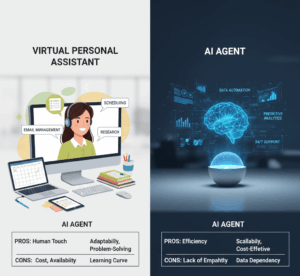Top 8 Essential Skills for Virtual Assistants in the UK: What You Need to Succeed in 2025
Did you know that the UK virtual assistant market is projected to exceed £38 billion by 2029, with 97% of VAs opting for full-time roles amid rising demand for specialised support? In a remote work era where businesses crave efficiency and expertise, mastering the right skills can transform you from an applicant to an indispensable asset for UK SMEs and entrepreneurs.
Key Areas We Will Cover
- The booming demand for VAs in the UK: 2025 statistics and why specialised skills matter now more than ever
- Exceptional communication: The foundation of client trust and seamless collaboration
- Time management mastery: Juggling tasks without dropping the ball in a hybrid world
- Project management prowess: Tools and techniques to deliver results on time, every time
- Customer service excellence: Turning interactions into lasting relationships
- Unwavering attention to detail: Avoiding costly errors in high-stakes admin
- Advanced technical proficiency: From AI tools to cloud suites for 2025 workflows
- Adaptability and problem-solving: Thriving amid change with innovative thinking
- Emerging trends: Social media savvy and AI integration for future-proof careers
Introduction
In 2025, virtual assistants (VAs) in the UK are more vital than ever, powering a market valued at billions as remote and hybrid models dominate. With 43% of managers reporting a 10-hour weekly workload reduction thanks to VAs and a 28% average productivity boost for businesses employing them, the role has evolved beyond basic admin to encompass specialised support in digital marketing, tech troubleshooting, and strategic planning. Yet, heightened competition means standing out requires a blend of timeless soft skills and cutting-edge technical know-how. This guide uncovers the top eight essential skills for virtual assistants in the UK, drawing on 2025 trends to equip you with actionable insights, tools, and strategies for career success, whether you’re launching as a freelancer or scaling with a platform like StaffNow.
The Booming Demand for VAs in the UK: 2025 Insights
The virtual assistant landscape in the UK is thriving, with industry revenue set to surpass £38 billion by 2029, driven by a 325% growth in firms like SpareMyTime and a 74% revenue surge in 2023 alone. By mid-2025, 53% of VA hires involve virtual onboarding kits to accelerate integration, while co-managed VAs, shared between two businesses, emerge as a cost-saving trend amid economic pressures.
Key drivers include AI augmentation, with 19% of companies blending bots for routine tasks, freeing human VAs for high-value work, and a 14% rise in Eastern European hires for multilingual expertise. For UK SMEs, VAs slash task turnaround from 28 hours (in-house) to 17.6 hours, boosting efficiency by 88% when paired with tools like Asana or Slack. However, specialisation is key: Demand spikes for VAs in niches like e-commerce management and SEO, where generalists risk being outpaced by pros with targeted skills.

1. Exceptional Communication Skills
Clear communication remains the bedrock of VA success, with 93% of businesses citing it as a top shortfall in candidates. In 2025, VAs bridge global teams via asynchronous tools, ensuring 24/7 responsiveness without burnout.
Why it matters: Miscommunications cost UK firms £37 billion annually; VAs mitigate this by articulating needs precisely, fostering trust in remote setups.
Verbal excellence: Master Zoom etiquette and active listening for video calls, where 72% of clients prefer face-to-face rapport.
Written prowess: Craft error-free emails and reports using Grammarly, tailoring tones for diverse audiences.
Digital fluency: Navigate Slack, Microsoft Teams, and WhatsApp for real-time collaboration.
Improvement tips: Practise summarising meetings in 100 words; seek feedback via LinkedIn Learning courses on persuasive writing.
2. Strong Time Management Abilities
With VAs often handling three-plus clients across continents, time management delivers a 67% efficiency gain. In 2025, it’s about prioritising amid AI-driven disruptions.
Why it’s crucial: 35% of VAs report overload from multi-client juggling; mastery prevents burnout and ensures 95% on-time delivery.
Pro techniques: Employ the Eisenhower Matrix to triage urgent vs. important tasks; block calendars for deep work.
Scheduling hacks: Use Google Calendar integrations for automated reminders, reducing no-shows by 45%.
Top tools: Todoist for task lists; RescueTime for tracking distractions, helping VAs reclaim 4 hours weekly.
3. Proficiency in Project Management
Project management skills turn VAs into strategic partners, with 74% of UK firms adopting collaborative platforms like Asana in 2025. Specialised VAs in this area command 20% higher rates.
Core needs: Plan, execute, and monitor from kickoff to close, aligning with client KPIs.
Break it down: Segment projects into milestones with deadlines; track via Gantt charts to maintain 88% efficiency.
Recommended tools: Trello for visual boards; Monday.com for advanced automations, ideal for e-commerce projects.
4. Customer Service Expertise
As first-contact points, VAs drive 52% higher retention through empathetic interactions, per 2025 surveys. In the UK, where 67% of consumers switch brands after one poor experience, this skill is non-negotiable.
VA’s role: Handle inquiries, resolve complaints, and nurture leads via multichannel support.
Key competencies: Empathy for rapport-building; swift problem-solving to cut resolution times by 30%.
Professional strategies: Listen actively, de-escalate calmly, and follow up with satisfaction surveys.

5. Attention to Detail
Accuracy is paramount, with data errors costing UK businesses £1.4 billion yearly; VAs’ precision ensures flawless execution.
Task impact: From data entry to scheduling, it upholds quality in 90% of admin duties.
Enhancement techniques: Implement checklists in Notion; double-check with AI proofreaders like QuillBot.
6. Advanced Technical Skills
Tech-savvy VAs are in hot demand, with 90% of small businesses adopting cloud tools by 2025. Proficiency here boosts employability by 24% via AI optimisation.
Essentials: Microsoft 365 for docs; Google Workspace for collaboration; Canva for graphics.
Emerging must-haves: Basic AI prompting in ChatGPT; CRM like HubSpot for client tracking.
Learning paths: Coursera’s Microsoft 365 Fundamentals or LinkedIn Learning’s Canva Mastery.
7. Adaptability and Problem-Solving Skills
Adaptability tops 2025 lists, with 74% of VAs needing to pivot amid AI shifts and global client demands.
Flexibility’s value: Handle surprises like deadline changes, enhancing resilience in remote setups.
Development strategies: Simulate scenarios via role-play; analyse past fixes with SWOT frameworks.
8. Emerging Trends: Social Media Savvy and AI Integration
No longer optional, social media management ranks among top VA skills, with platforms driving 66% of UK brand engagement. AI integration, adopted by 72% of VAs for cybersecurity and automation, future-proofs careers.
Social strategies: Curate content calendars; analyse metrics with Hootsuite for 20% engagement lifts.
AI essentials: Use tools like Zapier for workflows; ethical prompting to augment, not replace, human insight.
Conclusion
Mastering these eight essential skills positions virtual assistants in the UK for unparalleled success in 2025, from slashing workloads by 28% to commanding premium rates in specialised niches. By blending communication and adaptability with tech prowess and trend awareness, VAs become growth catalysts for businesses. Continuous upskilling via certifications like CPVA ensures longevity in this £38 billion market.
Ready to Elevate Your VA Career with StaffNow?
Unlock vetted opportunities and expert guidance: Join StaffNow today for tailored VA jobs, skill-building resources, and connections to top UK clients. Start your journey to flexible, high-impact work. Email [email protected] or visit staffnow.uk now.
Frequently Asked Questions
As virtual assistant roles evolve rapidly in 2025, prospective VAs and employers alike seek clarity on skills, trends, and pathways to success. This FAQ draws on the latest UK insights to address common queries, empowering informed decisions in this dynamic field.
Lorem ipsum dolor sit amet, consectetur adipiscing elit. Ut elit tellus, luctus nec ullamcorper mattis, pulvinar dapibus leo.
Explore More Insights

Should You Hire a Virtual Personal Assistant or Build an AI Agent? Pros and Cons
Should You Hire a Virtual Personal Assistant or Build an AI Agent? Pros and Cons Get in Touch In today’s fast-paced digital landscape, where businesses strive for efficiency and innovation,

Human Virtual Assistants vs. AI Agents: Pros and Cons for Your Business
Human Virtual Assistants vs. AI Agents: Pros and Cons for Your Business Get in Touch “Can AI truly outperform a human virtual assistant, or is the human touch still the

Will AI Agents Replace Human Virtual Assistants? Why Human Expertise Still Matters
Will AI Agents Replace Human Virtual Assistants? Why Human Expertise Still Matters Get in Touch “In a world where AI can schedule meetings and answer emails, will human virtual assistants

The Compliance Minefield: How UK SMEs Can Hire Flexible Staff Safely and Legally in 2025
The Compliance Minefield: How UK SMEs Can Hire Flexible Staff Safely and Legally in 2025 Get in Touch Navigating the legal complexities of hiring flexible staff is one of the

AI vs Human Hiring: What Works Best for SMEs in 2025?
AI vs Human Hiring: What Works Best for SMEs in 2025? Get in Touch Did you know that by 2025, AI could automate 40% of repetitive recruitment tasks, yet 67%

The SME’s Lifeline: Slashing Operational Costs in 2025 with Flexible Hourly Experts
Beyond the Hype: Making AI Work for Your SME Hiring (And When You Still Need a Human Expert) Get in Touch In 2025, UK SMEs face a perfect storm of
